Nusrat Fateh Ali Khan: A Journey from Qawwali at Lasuri Shah Shrine to the King
of Qawwali
Writer (Urdu): Imad Khaliq Translated in English by :Jamal Panhwar
In the 1960s, a young man is reciting Natiya and Arifana Kalam at the court
of Faisalabad's Sufi saint Sain Muhammad Bakhsh alias Lasuri Shah. This is
apparently not unusual. But what did anyone know that this boy from Punjab would
become the 'Emperor of Qawwali' in the world of music.
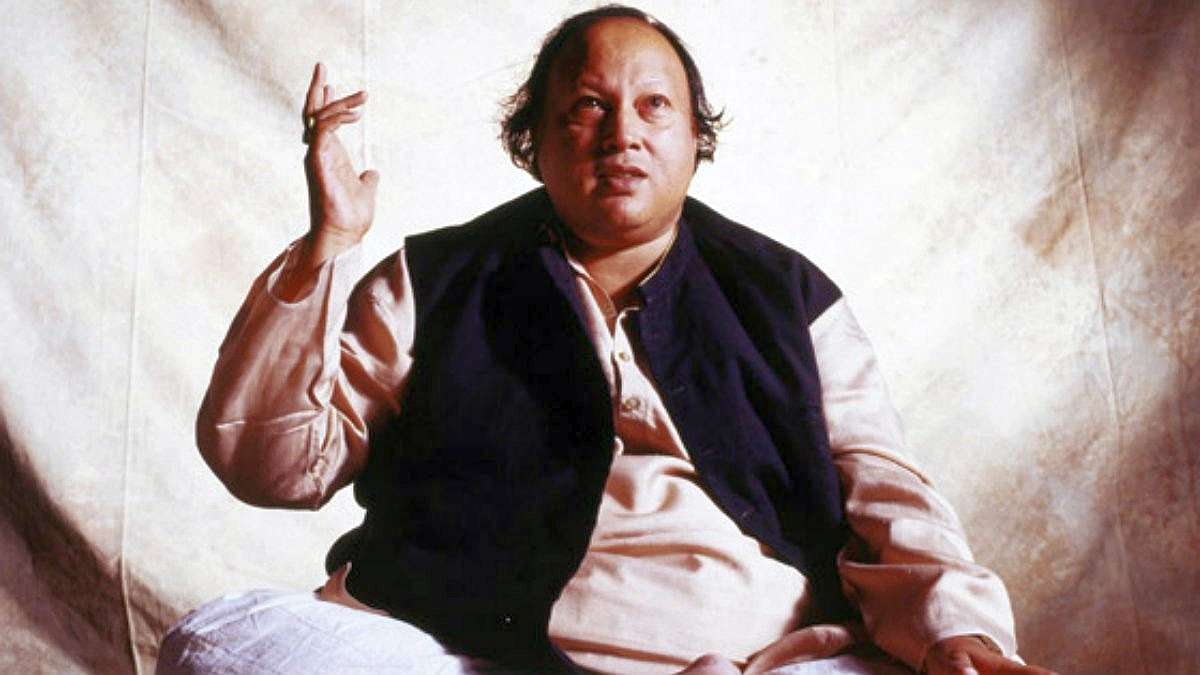
He belonged to the Qawwal family. Many youngsters like Nusrat were taught the
syllabus of musical tones, ragas, rhythm and laey right from childhood, whether
they wanted to or not, But this young boy was so skilled in the maturity of his
tones and the lifting of his voice that the listeners were lost in his charm.
The name of this son of Patiala family who migrated from Jalandhar in India
before the establishment of Pakistan was Nusrat Fateh Ali Khan. But this was a
time when no one knew Nusrat. Yes, everyone must have known that he is the son
of the famous Qawal Ustad Fateh Ali Khan of that era.
Nusrat had made music his passion since childhood and at the age of ten he
had mastered the tabla. After the death of his father, Ustad Fateh Ali Khan, in
the early 1960s, he started receiving regular Qawwali training from his uncle
Ustad Mubarak Ali Khan and Ustad Salamat Ali Khan, and Ustad Mubarak Ali Khan
died in the seventies. After he headed his Qawwal family.
Starting its artistic journey from a court in Faisalabad's famous Jhang Bazar,
this diamond caught the eye of a jeweler named Mian Rehmat, who owned a
gramophone record shop in Faisalabad since the creation of Pakistan.
Nusrat's father, Ustad Fateh Ali Khan, had an earlier ceremony.
The singer got tired, Nusrat's tabla did not stop
Mian Asad, who is the son of Mian Rehmat, the owner of Rehmat Gramophone
Recording Studio, says about Nusrat that he has many memories that are still
fresh in his mind.
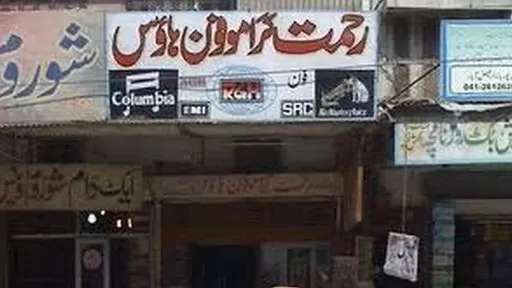
Rahmat Gramophone
He says that his father had known the family of Mian Rahmat Nusrat since the
1960s. "First of all, my father met Nusrat's father, Fateh Ali Khan, who was a
famous Qawal of Faisalabad at that time."
He says that 'My father knew Nusrat from his youth, but in the seventies when he
officially took over the leadership of his Qawwal family after the death of his
uncle Ustad Mubarak, my father adopted Nusrat as Artists began to notice.'
Mian Asad says, 'In the beginning, a Sufi sage of Nusrat Faisalabad, Sain
Muhammad Bakhsh known as Baba Lasuri Shah used to recite Natia Kalam and sing
Qawwali at the court. His residence was also in front of this court.
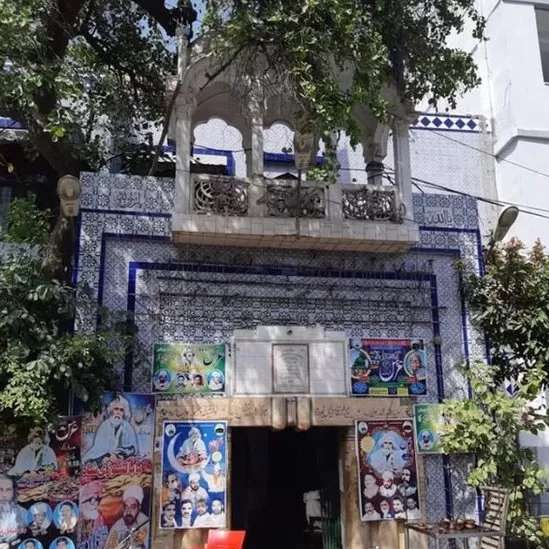
Darbar Lasuri Shah
Darbar of Sufi saint Sain Muhammad Bakhsh known as Bab Lasuri Shah in
Faisalabad According to Mian Asad, Ustad Nusrat was trained to play the tabla
before Qawwali and he played the tabla very skillfully.
Mentioning an incident that he has heard from his father, Mian Asad says that
'when Nusrat was ten or eleven years old, there was no tabla player in a Qawwali
gathering and Nusrat was asked to play the tabla. gone There he gave such a
performance that the singer got tired but Nusrat did not get tired and he cast a
spell on the listeners.
Nusrat taught to choose words, to read .
Mian Asad says that the series of meetings with Nusrat at Rehmat Gramophone
recording studio or at home had started since his student days. However, 'my
professional relationship with Nusrat was formally established in 1992 when she
started helping her father in his business.'
He says, 'I used to listen to his stories and talk from Abaji, we used to have
informal meetings with him, sometimes at the shop and sometimes at our house.'
Nusrat Fateh Ali Khan
, IMAGE SOURCEMIAN ASAD/REHMAT GRAMOPHONE
, image caption
Mian Asad points out that one of Nusrat Fateh Ali Khan's early qawwalis recorded
in Rehmat Gramophone was 'Yadaan Wichhe Sajna Diyan' and another was 'Ali Moola,
Ali Moola' which became very popular around the world.
According to Mian Asad, his father Mian Rahmat brought Nusrat to his recording
studio in the late seventies and early eighties from where he started recording
his qawwalis and ghazals and then reached the heights of growth and fame. gone.
Mian Asad points out that one of Nusrat's early qawwalis recorded on Rahmat
Gramophone was 'Yadaan Vachhe Sajna Diyaan' and another was 'Ali Moola Ali Moola'
which became very popular worldwide.
He says that hundreds of other Qawwals were also recorded.
'A series of numerous recordings of him began and he kept coming to our studio
recordings.'
According to Mian Asad, Rehmat Gramophone House Recording Company recorded more
than one hundred music albums of Nusrat and released them in the market.
Among them are many other sayings including the Sufi sage Baba Balhe Shah's
speech 'Ki Jaanaan Mein Koon'.
Rahmat Gramophone
, IMAGE SOURCEMIAN ASAD/REHMAT GRAMOPHONE
Skip to content
Drama Queen
Drama Queen
Hear the never-to-be-shared stories on the 'Drama Queen' podcast
Episodes
Skip to content
He says that 'if Nusrat and Rehmat sit down to remember the relationship and
journey of Gramophone, there is an endless chain that will continue.'
Another such person is Ilyas Hussain, who has been Nusrat's disciple and
prompter in his Qawwal party since his youth.
It should be noted that a prompter is a person who sits behind the main Qawwal
during a show or recording, holding a book of words or ghazals, and reminds or
tells the next stanza of the Qawwal.
58-year-old Ilyas Hussain recounts his memories and says, 'Our family has been
serving in Fateh Ali Khan's family for many generations. I have known Nusrat
Fateh Ali Khan since 1975, when I was a school-going child and used to go to
work with my father at his house. I was his disciple, joined his Qawwal Party
from 1983 till his death in 1997.
He says that 'my grandfather and father were also students of his family, we
loved this family.'
He says that when I started going there from the age of ten, after some time I
was told by Ustad Farrukh Fateh Ali Khan who is the father of Rahat Fateh Ali
Khan that I should learn to do prompt work. Gradually Ustad Nusrat and Farrukh
Fateh Ali Khan started teaching me this.'
He says later, 'I was taught to choose words and to read and write by Ustad
Nusrat Fateh Ali Khan.'
Ilyas Hussain recalls that among the famous qawwalis recorded in Rehmat
Gramophone, 'Lajpal Nabi Mere Dardaan Di Dawa' and Ghazals 'Yadaan Vachhe Sajjan
Diyan Ayan Ankhiyan Cho Mihna Vasda' are included among hundreds of others.
Solo for the first time: ' Come on, Khan Sahib, record a solo. '
Nusrat Fateh Ali Khan
, IMAGE SOURCEMUHAMMAD FAROOQ RAO/FAROOQ STUDIOS
Mian Asad tells the story of Nusrat Fateh Ali Khan's first solo recording as
follows: 'It was the time of the eighties and one day Rahmat Gramophone came
ahead of time for Ustad Nusrat's recording and despite the wait, his When
Humnawa did not arrive on time, my father said to him in Punjabi, 'Come on, sir,
record this solo, yes.'
At first, Nusrat Fateh Ali Khan was worried about this, but then on my father's
insistence, he supported me and immediately got a ghazal written by a poet in
the studio, and he started recording solo for the first time.
"One of the most popular of his early solo recordings was 'Sun Charkhe Di Mitthi
Mitthi Cook'," says Mian Asad.
'When this ghazal hit the market, his singing got a new boom. Rather, for this
reason, many singers and colleagues were angry with us that now Khan Sahib
probably does not need them.'
Nusrat's special sofa in the studio
Mian Asad, the owner of Rehmat Gramophone, recalls that Nusrat had a very close
and friendly relationship with his father, who often visited the shop as he was
fond of conversation.
'Due to his heavy size, he found it difficult to sit there for long, so my elder
brother made a special sofa for him so that he could sit on it comfortably.'
It was not possible to find this sofa, but whoever sits on this sofa will be a
very lucky person.
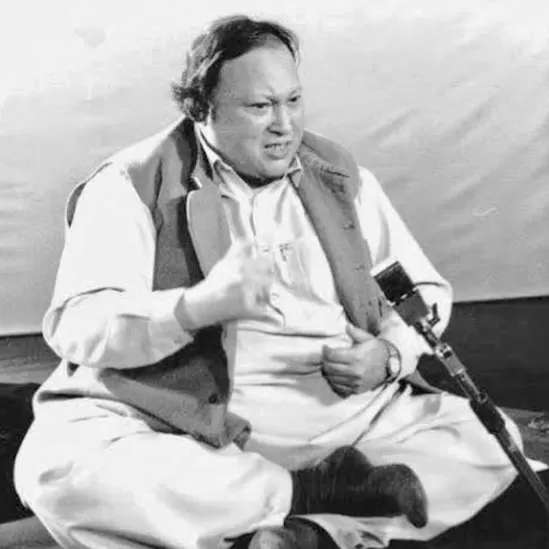
Mian Asad says, "If I analyze the experience of professional relationship
with Nusrat Fateh Ali Khan, I can say that perhaps he is the only Qawwal who
does not have any words, any ghazal, which is playing somewhere and listening to
music." Tell it to forward it.
'People listened to their voice, listened to their payment. He loved music and
was very sensitive about it.'
Ilyas Hussain, his long-time colleague, disciple and friend, says that "No
matter how long Khan Sahib performed in any part of the world, when he came back
to the hotel, he would tell us to put my harmonium baja in my room." When we
wake up after finishing our sleep, we see them doing Riyad on it.'
According to Ilyas Hussain, 'He used to sleep with his harmonium on the bed even
while sleeping, and even in his sleep, one finger was placed on it.'
Ilyas says, 'When there was no harmonium in the plane during the journey, he
used to practice his head with his fingers on his chest or stomach.'
'I have never seen him without a harmonium in all my life,' he explains.
Nusrat Fateh Ali Khan
Mian Asad narrates an incident related to Nusrat Fateh Ali Khan's understanding
of music and tones that 'In a huge private gathering where he himself was
present, Nusrat Ali Khan was performing and people were going crazy over his
tunes and qawwalis. While swinging, the notes of the whales were pouring out on
him, that suddenly he signaled to his maker that the heads of the harmonium are
not right, let me see what is the problem. A 1000 note was stuck which was
stifling the tone.'
Read more
'Qawwali should also be given public color'
'The demand for Qawwali's live show has increased'
Baba Farid's court is the 'spiritual home' of Qawwals.
' Do you know who these are? '
While praising Nusrat Fateh Ali Khan, Mian Asad says that 'He was a dervish
person, very sincere and respectful and faithful person.'
According to Mian Asad, 'Nusrat Fateh Ali Khan was fond of gatherings of friends
and loved to chat, but most of his conversation was music.'
He says that Nusrat 'used to come to the shop (Rahmat Gramophone House) two or
three hours before the recording and chat with my elder brother Mian Arshad and
father.'
Mian Asad says, 'He was a very honest and considerate person. He was a
sophisticated person with a very sensitive nature.
Nusrat Fateh Ali Khan
, IMAGE SOURCEILLAYAS HUSSAIN
Mian Asad says, 'As my father gave him a break through his recording studio, he
always considered my father as his benefactor and elder brother even though
there was a huge age difference between the two.'
Mian Asad says, 'During this period, Nusrat also got a lot of fame, so the name
of Rehmat Gramophone also went up a lot.'
He narrates an incident about Nusrat's reluctance, humility and relationship,
saying that 'in the nineties, when Nusrat was at the height of his fame, my
father and elder brother went to meet him in Lahore.
At that time, a foreign delegation was meeting him, so his staff made my father
and brother sit in the waiting room and waited for about an hour. When Nusrat
came to know about this, he immediately got up from the ongoing meeting with the
delegation and came out barefoot and immediately took my father and elder
brother inside and said to the staff, 'Do you know who these are?'
He who sits on the ground does not covet money
Mian Asad says that Nusrat Fateh Ali Khan was not greedy for money like many
other artists. He said that even in his prime, if my father asked him to do a
program somewhere, he never asked or demanded money. Rather, they came to
perform silently.
Ilyas Hussain also supports this and says that 'whoever came and sincerely
requested Nusrat for a Qawwali gathering or program, he accepted this request
without any money.'
According to him, when a middle-class fan would invite him, he would 'regularly
urge his secretary and us not to harass him for money and also not to make any
kind of argument there.'
Ilyas Hussain says 'My teacher was a dervish, I didn't know how great a person
he was even living with him. If you make them sit on the ground, they would
sit.'
Shaukat Khanum Hospital Fundraising
Nusrat Fateh Ali Khan
, IMAGE SOURCEILLAYAS HUSSAIN
Ilyas Hussain says that when Imran Khan announced the construction of Shaukat
Khanum Hospital after the 1992 World Cup, he along with Nusrat did several shows
in Europe and America to raise money for this work.
Ilyas Hussain says, 'My teacher supported Imran Khan's hospital a lot and did
many shows for him absolutely free.'
Imran Khan is also one of the big fans of Nusrat. In one of the footages, it can
be seen that he is making specific requests to Nusrat and listening to his
Qawali with pleasure.
Relationship with your creators and peers
Nusrat Fateh Ali Khan
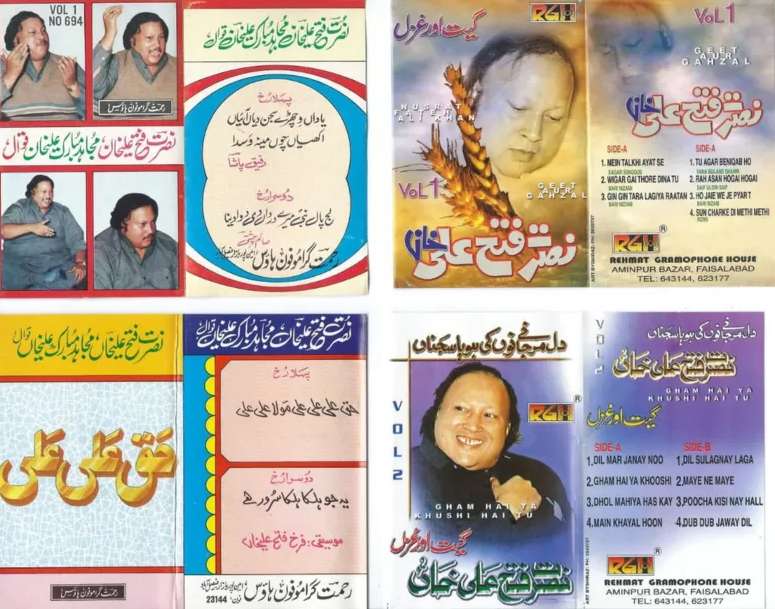
Nusrat Fateh Ali Khan's good manners were not only limited to his fans and
other personalities, but he used to behave very well with his producers and
peers as well.
According to Mian Asad, "Whenever Nusrat Fateh Ali Khan had to go for a Qawwali
concert or recording, he would come to the shop two or three hours before the
scheduled time, while his colleagues in the Qawwal party kept him waiting for a
long time." On which he would have been worried, but never seen him say
anything.'
While Ilyas Hussain says that the teacher used to scold only during the
rehearsals at home that now do Riaz properly, whatever mistake is here, don't do
it in front of people, but never during a show or during recording. No
scolding.'
Mian Asad says that often after the recording, he used to chat and joke with his
friends and would point to one of them and tell them to 'jagat' or make fun of
the other, but his sense of humor was very good and good-natured.
Ilyas Hussain also supports this and says, "Yes, he was keen on work and used to
ask us to take each other's 'cheza' and kept smiling, but he never made fun of
any immoral thing."
Journey from 'Singing Buddha' to 'Mr Allah Ho'
Nusrat Fateh Ali Khan freed music from the constraints of color, race,
religion and language and everyone went crazy for his tunes, lyrics and music.
Everywhere in Asia, Europe and America, he started being called the uncrowned
king of music and the great poet.
Ilyas Hussain says that Nusrat Fateh Ali Khan's spiritual influence of Sufi
speech would have been such that he would have gone into a state of ecstasy and
his eyes would have become moist during the praise of Allah.
Ilyas Hussain says that "when he sang 'Allah Ho Allah Ho' on a tour of Europe,
the whites didn't understand, but he kept swinging madly. People in France gave
him the title of Mr. Allah Ho."
According to Ilyas Hussain, wherever he went in Europe, people would call Nusrat
Fateh Ali Khan as 'Mister Allah Ho'.
In Japan, when he performed at a music festival in Fukuhoku, the Japanese people
gave him the title of 'Singing Buddha', meaning the god of music, because of his
vocals and singing.
Ilyas Hussain explains that 'whenever Japan would go for a show, as soon as they
entered the hall, everyone would get up from their seats and before the show
started, at least a minute of silence would be observed in their respect. '
Hardly anyone can escape the magic of Nusrat Fateh Ali Khan's voice, the charm
of his singing used to capture the common fans, even the top singers and artists
could not stay swayed by his tunes.
Mian Asad tells one such incident that 'at his elder brother's wedding where
famous singers, musicians and artists from all over the country were present,
such an atmosphere was created that Nusrat Fateh Ali Khan was singing 'Waariyan
Saiyan Tere Wariyan' Qawwali and Atta Allah Isa Khelvi was putting the
chandelier.
While Ilyas Hussain tells the story of Nusrat's singing of the famous song 'Mera
Piya Ghar Aya' during a live show in America in the nineties, he says that 'when
Khan Sahib started that song, the whites in front of the stage started shouting.
started pouring, one of them women poured so much that her feet started
bleeding.'
Fifty hours of rare recordings
Asad, son of Rehmat Gramophone owner Mian Rehmat, claims that even today he has
fifty hours of rare recordings of Nusrat Fateh Ali Khan's songs, which have
never been released to the market.
He explains that since the death of his father and elder brother Mian Arshad,
who were more involved in the business, and the liquidation of the Rahmat
Gramophone Company, everything has been put on hold.
He claims that even today he has 50 hours of rare recordings of Nusrat Fateh Ali
Khan's Qawwals and songs which have not been released in the market at any level
till date.
The question of forgetting the word does not arise
When Ilyas Hussain was asked a question related to the nature of his work,
whether Nusrat Fateh Ali Khan ever forgot a word during a show or recording, he
said, "From 83 to 97, I never saw him do that. He had a very good memory and
memorized all the words.
"I gave them a few stanzas wrong but they remembered them so they lengthened
their tone and take."
Narrating an incident, he said that during a show in America in the early 90s, I
got him to say a few verses wrong, but he remembered them, so he lengthened his
tone and take and by the time I got them right, They did not pay it.'
He says that 'I have never seen such a Qawwal, he was just his own color.'
Entry of 'Must Qalandar' and 'Haq Ali Ali'
According to Ilyas Hussain, Nusrat Fateh Ali Khan loved the words 'Must Qalandar',
'Allah Ho' and 'Haq Ali Ali' so much that he used to cry uncontrollably while
singing them.
He says that the speech of 'Haq Ali Ali' would have come to him in such a way
that he was not even aware of it himself.
"My teacher was like a saint," he recalls.
Read more
Also read this
Nusrat Fateh Ali Khan lives in our hearts even today.
No one knew when Nusrat would do something new.
'The intoxication of Nusrat's voice remains even after the song'
Ilyas Hussain says that despite the popularity of Nusrat, he did not forget
other artists. He says that Ustad Nusrat Fateh Ali Khan inspired and greatly
encouraged country's famous solo ghazal singer Ejaz Qaiser from Faisalabad by
giving his tunes, styles and words.
According to Ilyas Hussain, he used to make his recordings and play them to
overseas promoters so that he too would get a chance to perform abroad.
Establishment of Sargam Studio
Ustad Nusrat established his own recording studio Sargam in Lahore in the early
nineties and started making many recordings.
He had moved from Faisalabad to Lahore in the early nineties.
The movie ' Kachche Dhage ', India tour and then the last tour
Nusrat Fateh Ali Khan
, IMAGE SOURCEGETTY IMAGES
According to Ilyas Hussain, when Nusrat arrived in India for the Indian film 'Kachche
Dhage', there was a long queue of his fans and Bollywood artists in the hotel
lobby.
He says, 'The hotel lobby was completely packed, with ordinary fans as well as
actresses like Hema Malini coming to meet him.'
Recalling Ilyas Hussain Nusrat's last visit to England during which he died, he
says that 'before the visit, he called all the Qawwal party in Sargam studio and
said that he is going to England, then there is a visit to America where you I
will meet people, now I am not feeling well, I will come back and just make
India America and what will I do there.'
But he probably did not know that even after his departure, the whole world
would continue to sway on his Qawwali.
Delayed show due to daughter crying
Nida Nusrat
, IMAGE SOURCENIDA NUSRAT
, image caption
Nusrat Fateh Ali Khan performing Riaz with his daughter Nida Nusrat and his wife
The only child of Ustad Nusrat Fateh Ali Khan is his daughter Nida Nusrat who is
now living in Canada.
Talking about her father's memories, Nida Nusrat said that 'I was thirteen or
fourteen years old when he died, I didn't spend much time with him, but after he
regained consciousness in his twenties, I spent six to seven years. The memories
of the period are such that my life is worth.
She said that she feels very proud to be called the daughter of a legendary
artist.
'There is hardly any artist and father like him. It is my good fortune to have
the honor of being the daughter of an artist who shines on the global horizon.'
She says that 'many people often ask me why I came to the public after such a
long time, people don't know about me, so I say that my father was not a normal
person. I am still 16. Living in the sorrow of August, I have not been able to
come out of it till today.'
Recounting the memories of her time with Ustad Nusrat, she says, "He loved his
work, he did not have much time, but whenever he was making a style at home or
doing riyaz, I used to listen to him." She listens and watches them secretly
from behind the curtain of the room.
She says that 'there was a part of our house where children and women were not
allowed to go, they would have known that I was hiding behind the curtain, if
they saw me, I would run away from there.'
Talking about his love as a father, Nida Nusrat recalls that 'I was very fond of
pens and color pencils as a child, so wherever he went in the world, he used to
bring me many expensive and different pens and color pencils. They would bring
lots of coloring boxes, half of their stuff would be my stuff.'
Nusrat Fateh Ali Khan
, IMAGE SOURCENIDA NUSRAT
Recounting a memory, she says that 'due to the busyness of work, he could not
give much time to the family and he felt it very strongly.
Once he came back home after a show from abroad, he took me in his arms and said
now I will spend time with my daughter. On this Zaro row started crying.
According to Nida Nusrat, he had a very sensitive nature.
Nida Nusrat said that when we were together, father and daughter, he would
forget about the world around him, he would give me all his attention.
"Perhaps he knew to leave the world early, he wanted to do everything quickly.
When mother asked why God has given you so much fame, why are you in a hurry,
then Baba would say that he cannot explain to you people right now."
Nida Nusrat says, 'Whenever there was an opportunity to go with him to a show
abroad, he would sit me right in front of the stage and his eyes would sparkle
when he saw me during the show. Even during the break, they kept calling me on
the stage and asking me.
About a childhood incident, Nida Nusrat said that 'I was about six years old at
that time and I was with him for a show in London, due to leaving home early, I
forgot my pacifier and when I entered the hall for the show. When I reached, I
started crying, on which Baba got very upset.
"He couldn't see me upset, on the other hand the show organizers were asking him
to start the show because there was a delay, he said I can't start the show
until my daughter calms down.
'So a man was sent back to the house to suck me in and when I was quiet they
started the show late. During the show, he came to me in the break and kept
loving me.'
Nida Nusrat
, IMAGE SOURCENIDA NUSRAT
She says that whenever one of her albums was released, she would give me the
first copy and release it in the market the next day.
When Nida was asked if Nusrat ever asked her to sing, she said, "It is our
family tradition that women do not sing, but sometimes when they were at home
and during Riyad, they would call me and say, along with me." I used to sing
along with them.'
'I have never sung professionally but even now I hum a few things at home
functions,' she explains.
Nusrat's daughter said, 'In childhood, I used to get scared of small things and
if they happened, I would hide behind them.
'He always told me you are my daughter not my son, never fear anything and
always face everything bravely.'
'My mother and I ache and will always wish we could have gone with him on his
last visit to London.'
This site contains information & guide to every city of Pakistan. News articles and
a lot of information. Please click the related links below.
Pakistan Profile (Basic information about Pakistan
Population, GDP Geography etc.)
Flag of Pakistan, Map of Pakistan
Maps of Pakistan
History of Pakistan (Chronological history of Pakistan) Archeology of Pakistan
Old Punjab Images
Museums in Pakistan
Provinces (Information about the culture of each
province)
Distances between major cities of Pakistan
Weather information
Airports of Pakistan.
Land communication (Railroads & Highways)
Gardens in Pakistan
Mountains of Pakistan
Pakistan Currency Notes
Hotels In Pakistan.
Custom Rules in Pakistan Baggage Rules
Import of personal vehicles
Punjabi Sufi Poetry
Sindhi Sufi Poetry
Music Of Pakistan
Urdu
phrases for Tourists


Advertise on this site click for advertising rates